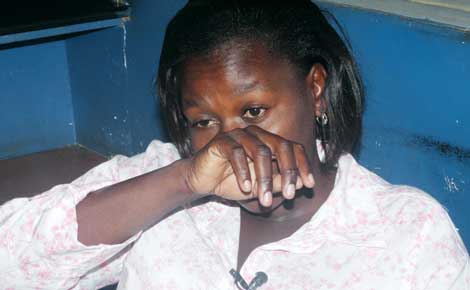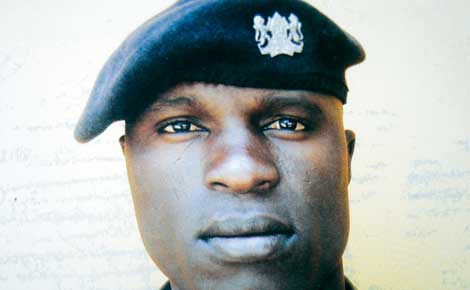 |
|
Doreen Magak, widow of the late Lieutenant Edward Juma Okoyo. |
By Paul Wafula and Nyambega Gisesa
Kenya: It is pitch dark and Kenya Defence Force’s platoon Commander Lieutenant Edward Juma Okoyo is in the muddy trenches of Somalia. As with every African night, the chirping of crickets filled the air, while perhaps, a few of the soldiers who were not on night-watch, snored gently inside their jungle-green sleeping bags.
Then Okoyo, probably homesick, forlorn and thinking about the love of his life in Kenya, broke the single basic rule of survival; he pulled out his cellphone and called his 29-year-old new wife he had just recently married – Doreen Magak.
Or it could be that he had a premonition of his death, which would follow swiftly; in seconds. Perhaps something nudged him to make his last call and to the person that mattered most to him in life.
He had just finished the greetings and love jokes, and was now asking how Kenya was, unaware that the flicker of his phone’s screen had put him squarely in the crosshairs of a sniper.
In a matter of seconds, and stealthily (because snipers mute the sounds of their gunfire using silencers so as not to be located easily) Okoyo and some of his soldiers lay dead. The sniper’s bullet got the man next to one eye.
“He told me it would be okay, he said things would be alright,” narrates his widow. Okoyo made the phone call that his wife would regret for the rest of her life on the night of January 22, 2012, a month after they got married.
This is how Doreen recalls the lowest moment in her life: “I was on the phone with him when he suddenly went silent. He had been inquiring how Kenya was. He was calm, but then suddenly I was the only one on the line.”
She adds: “I tried speaking to him but he never responded.” She then sent several messages to him, which were never delivered. After several calls that went unanswered the ground beneath her shifted as the world around her crumbled. This was because of a three-worded SMS — probably from a soldier watching over Okoyo’s dead body — that came hours later. It ran: “He is dead’’.
 |
|
Lieutenant Edward Juma Okoyo. |
Doreen had spoken with her new husband daily over the phone. It was the only way to keep the flame of their love alive. The couple was on their third day of honeymoon in Kisumu when Okoyo received a call from work asking him to report back to work.
In Somalia, Okoyo sent text messages filled with love to his wife.
She would later find out that the sniper’s bullet blew off half of the head of the platoon commander with the 1KR (Kenya Rifles). Half of his men also died in the spray of bullets.
Her wedding ring had not even stayed long on her finger to leave the curve and mark of marriage that comes with time.
Relatives and friends had constantly reminded her that Kenya’s only war required military spouses to be strong and brave. In spite of that, she had reached the breaking point.
“I have destroyed all photos and videos about him,” she admits, tortured by memories. “Any thoughts about him drive me crazy.”
Stay informed. Subscribe to our newsletter
Hates weddings
Doreen gets by through her deep Christian faith. She goes to church more often, she says “to cope with her loss”. She also avoids people who would talk about Okoyo or keep reminding her of him.
And there is more. She hates attending weddings. “I avoid weddings, they carry bad memories. I can’t even stand those ones aired on TV. When friends invite me for their weddings, I promise to attend, but I never turn up on the D-day,” she reveals.
Even worse, she says it is painful for her to watch her own wedding video than that of Okoyo’s funeral.
For the young widow, it all sounded like a cruel joke in the beginning. Memories of their honeymoon at Sunset Hotel in Kisumu are still fresh.
The previous month, Okoyo had arrived home from the war in Somalia for their wedding. The raw video of their wedding was still being edited. Okoyo would never get a chance to watch it. Okoyo had arrived home on December 10, 2012. Says Doreen: “He was here for about two weeks and left shortly after the honeymoon. He was gone before Christmas.”
Okoyo was laid to rest on February 5, 2012.
Yet what torments her most is being accused of causing her husband’s death. It was against the set rules to receive phone calls at night. Most soldiers would cover themselves in their trenches to receive calls.
“There are some of his friends in the military who believe I called him that night yet he is the one who called me. They said the light of the phone could have revealed their location. But those who were with him know the truth,” she says
Their love story begins in the most unlikely of places; a chance meeting at a supermarket. Neither knew the other. Their meeting was just as dramatic as their end. “Edward was leaving Tuskys Supermarket in Kisumu after shopping. He just said ‘hi’ at the entrance. I was on my way into the supermarket,” Doreen remembers.
They immediately struck a rapport and exchanged contacts. Over the next few weeks they fell in love and a year of dating later they were ready to settle down. She describes Okoyo as a ‘humble handsome and respectful person.’
“He told me the real job he was doing the first time we met and this was quite something for me,” she says.
Their wedding started late and it rained a lot on the day. Some would view this is as a sign of blessing of their union. “I would rather not remember that (wedding), but we started the wedding late and after rings were exchanged it started raining so much. Everyone was trying to shelter from the rain and then after that we went for the honeymoon,” she says
During their brief honeymoon, the couple started planning for their life together. Doreen was working in Kakamega while Okoyo was based in Nanyuki. He told her he would be seeking a transfer so that he could be closer to her.
Doreen wanted to have one child. Okoyo wanted two.
“He really respected people, especially women,” Doreen said.
His father, Mzee Okoyo Onwayo describes his son as a calm hardworking young man who loved farming.
Okoyo grew up in Homa Bay County and attended Othoro Mixed Secondary School and later transferred to Yala Boys.
The pain of a short marriage and life with Okoyo has not healed completely. “I cannot tell everyone that my husband died in Somalia. I go out with friends a number of times, but I am not yet ready to move on,” she says.
She regrets that Okoyo was never given a longer break after the wedding from the battlefield. “He shouldn’t have been taken to Somalia. He may not have died that kind of death. It would have been easier for me if he had died here in Kenya,” she says.
[email protected]
[email protected]
 The Standard Group Plc is a
multi-media organization with investments in media platforms spanning newspaper
print operations, television, radio broadcasting, digital and online services. The
Standard Group is recognized as a leading multi-media house in Kenya with a key
influence in matters of national and international interest.
The Standard Group Plc is a
multi-media organization with investments in media platforms spanning newspaper
print operations, television, radio broadcasting, digital and online services. The
Standard Group is recognized as a leading multi-media house in Kenya with a key
influence in matters of national and international interest.
 The Standard Group Plc is a
multi-media organization with investments in media platforms spanning newspaper
print operations, television, radio broadcasting, digital and online services. The
Standard Group is recognized as a leading multi-media house in Kenya with a key
influence in matters of national and international interest.
The Standard Group Plc is a
multi-media organization with investments in media platforms spanning newspaper
print operations, television, radio broadcasting, digital and online services. The
Standard Group is recognized as a leading multi-media house in Kenya with a key
influence in matters of national and international interest.







